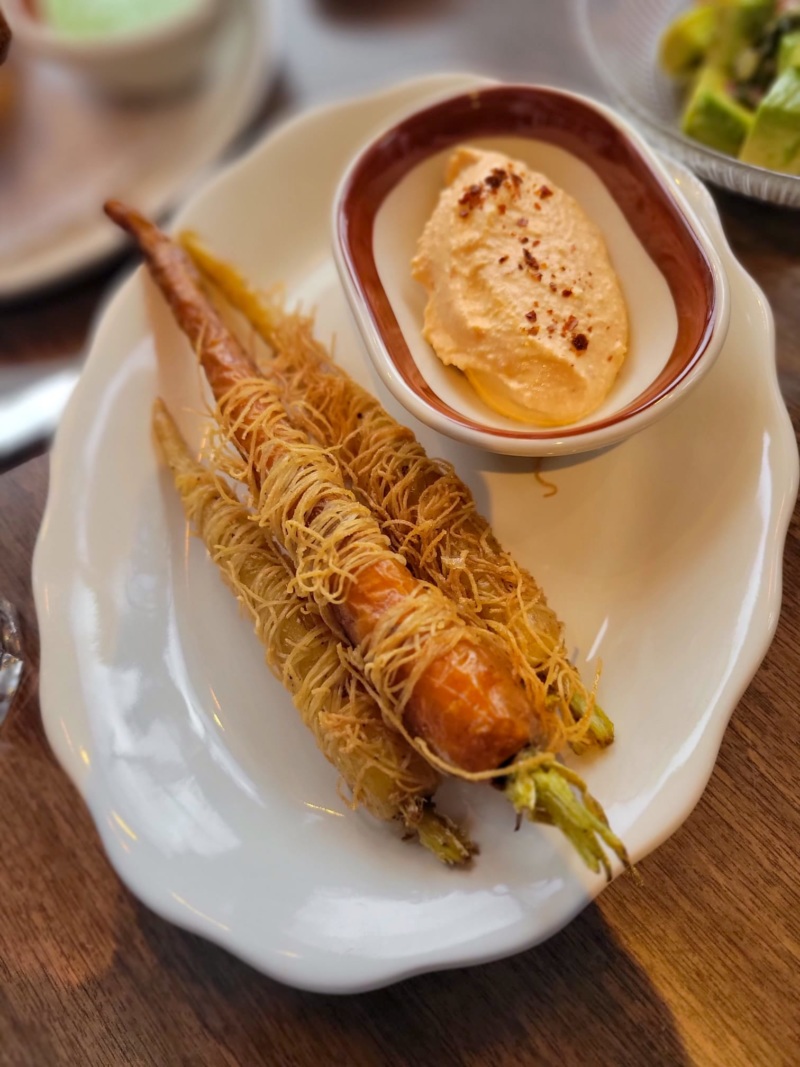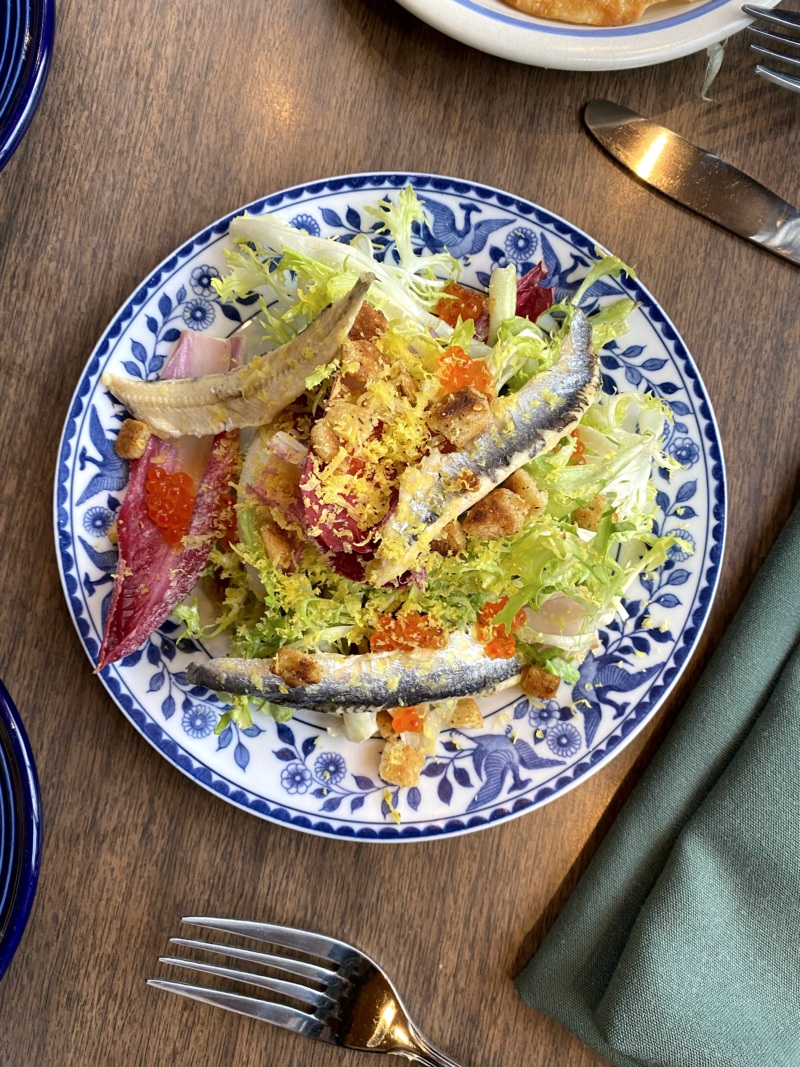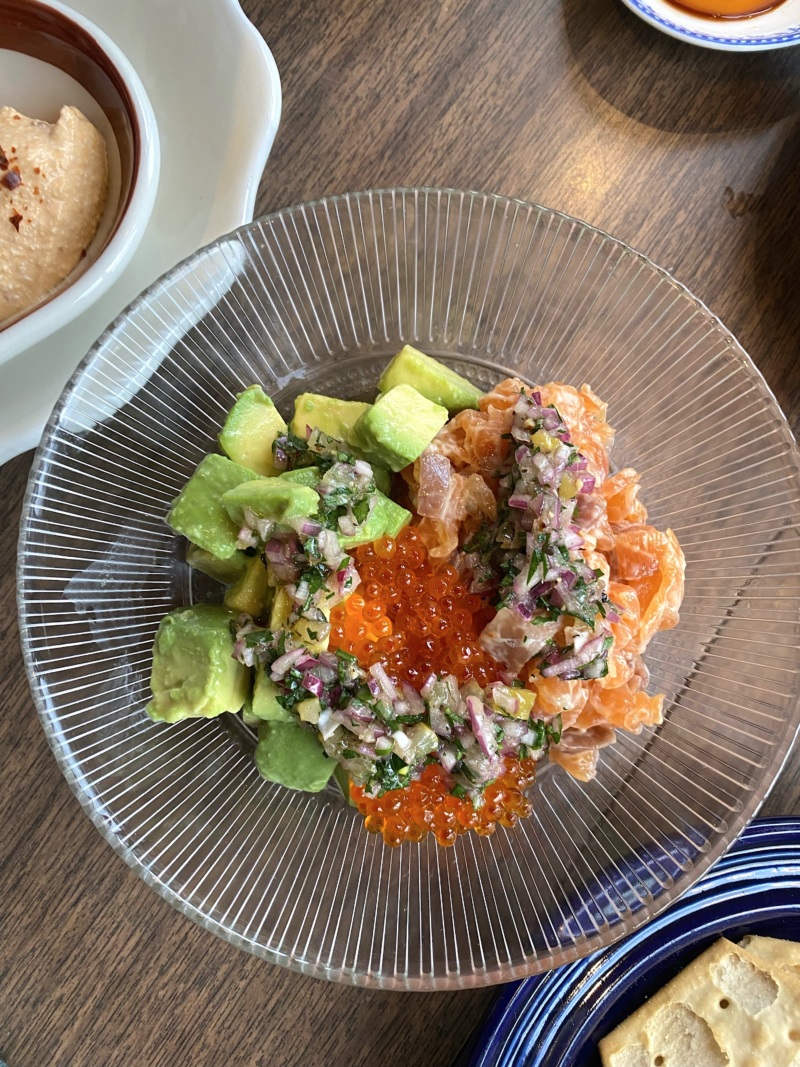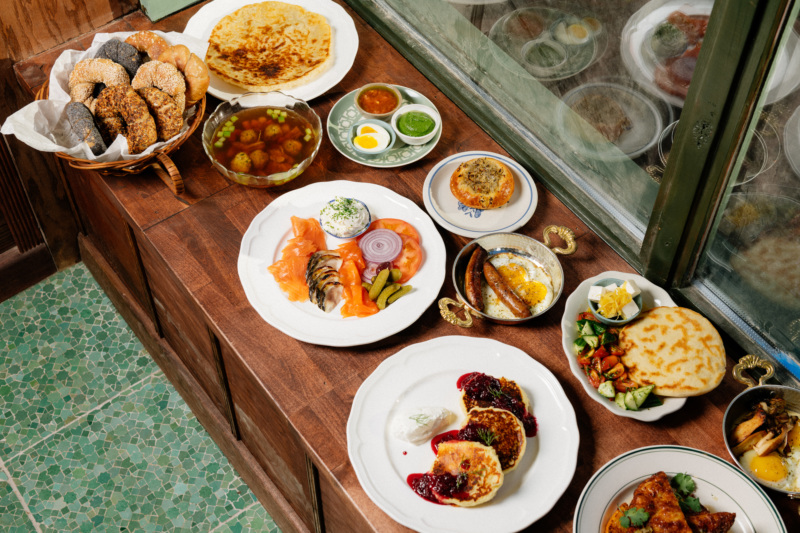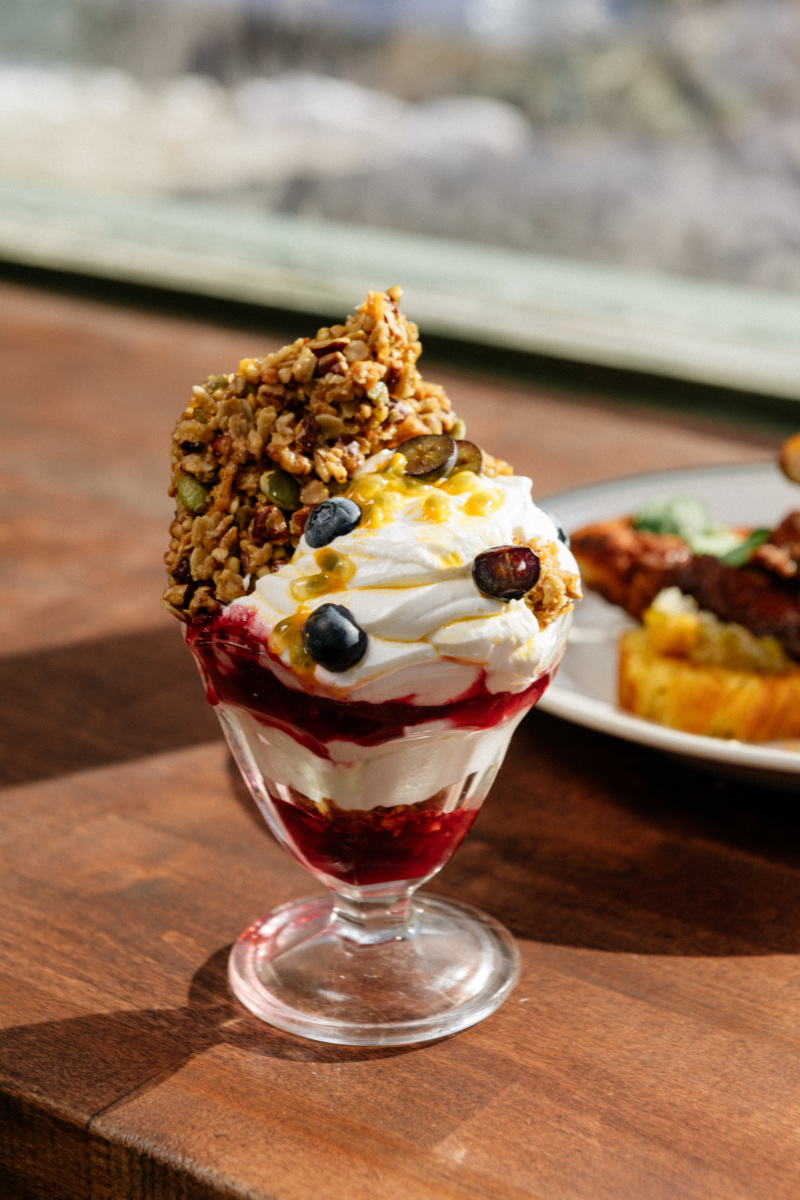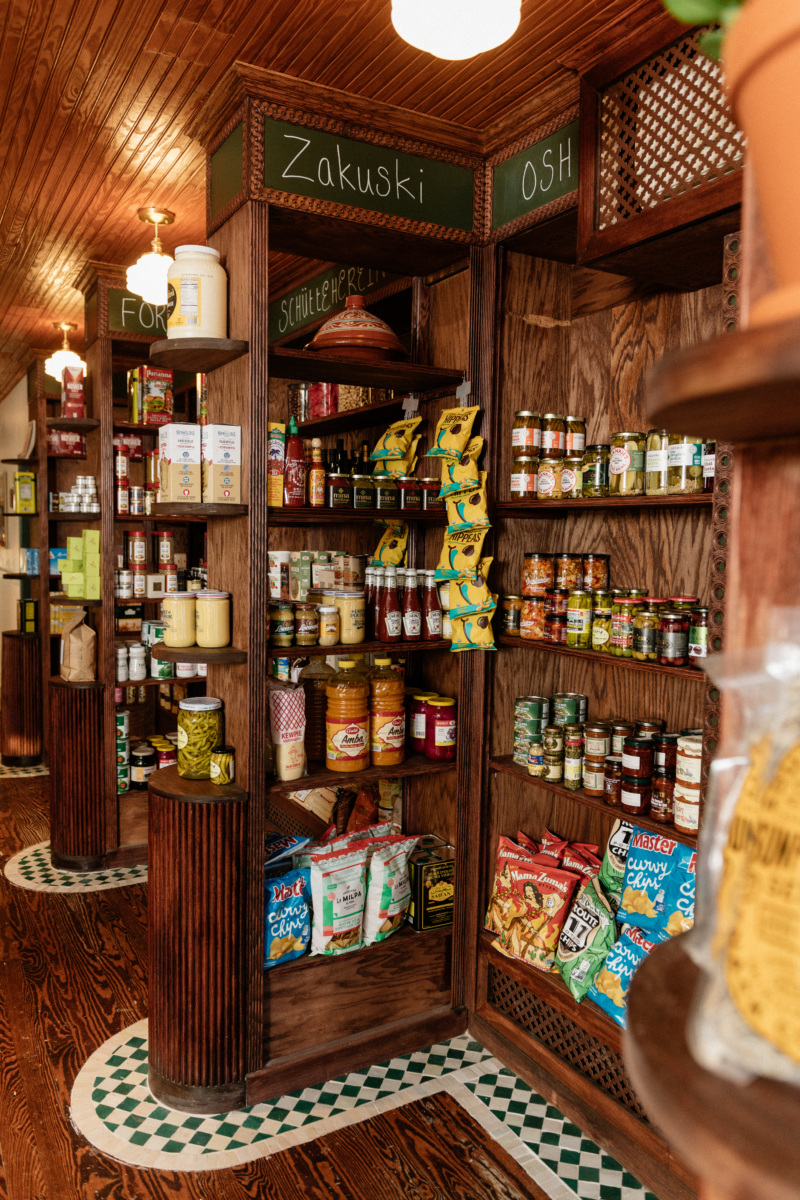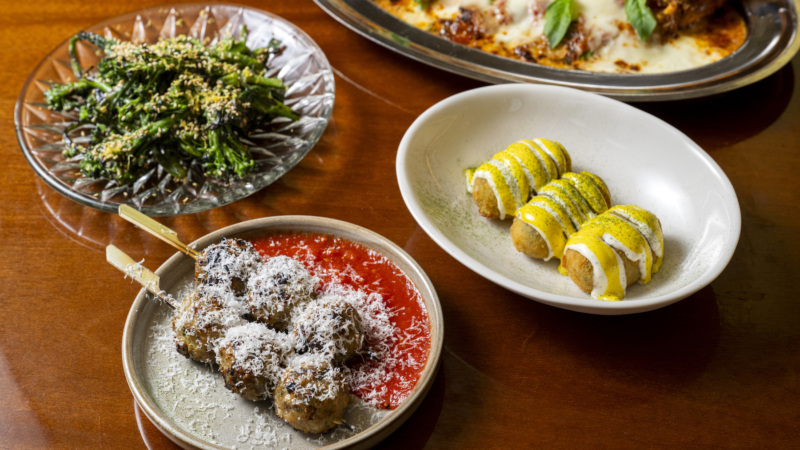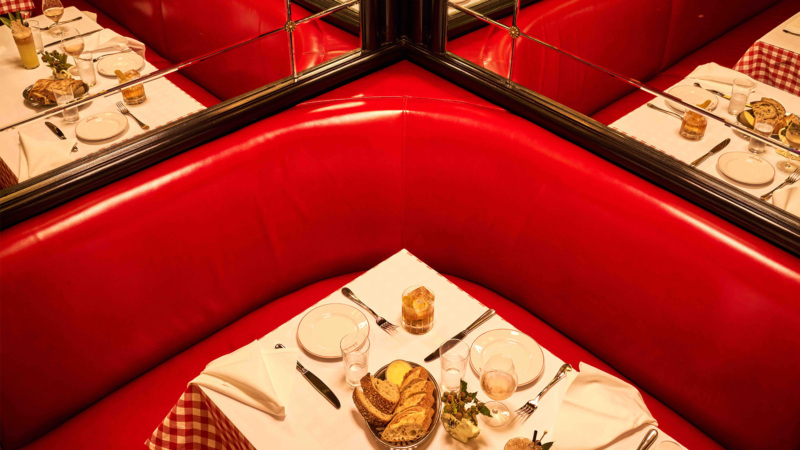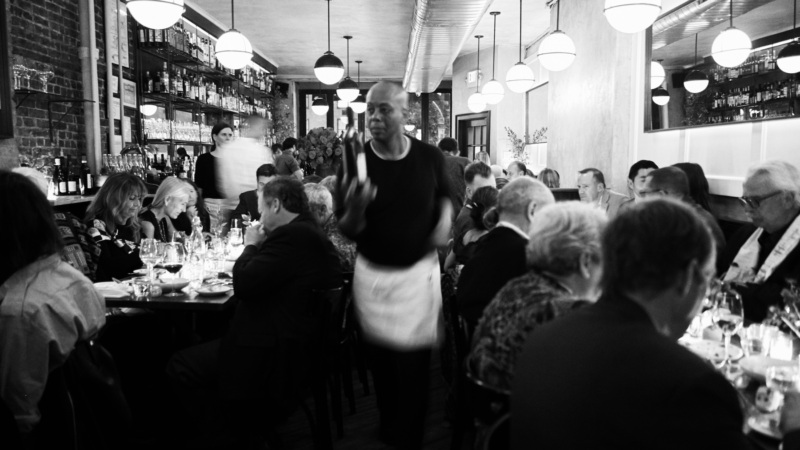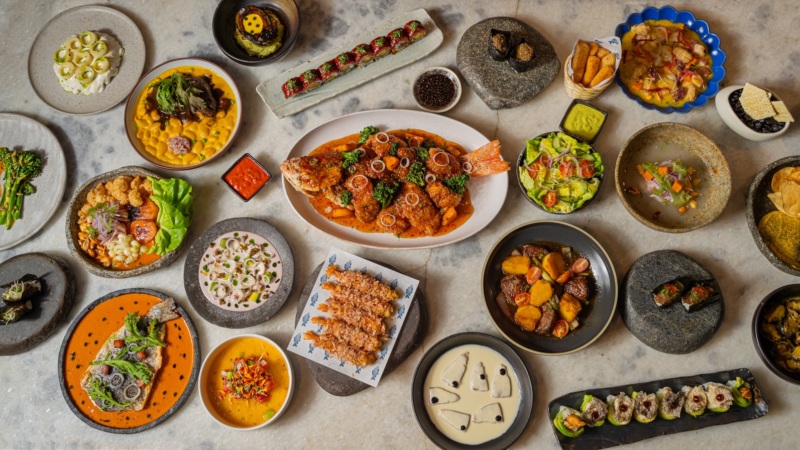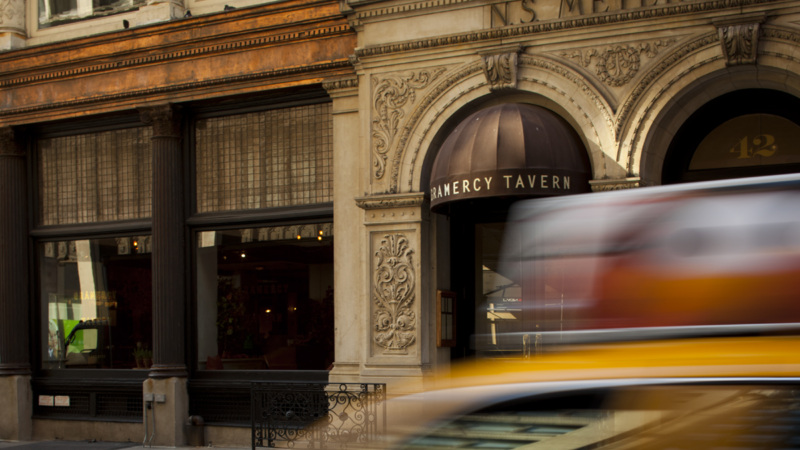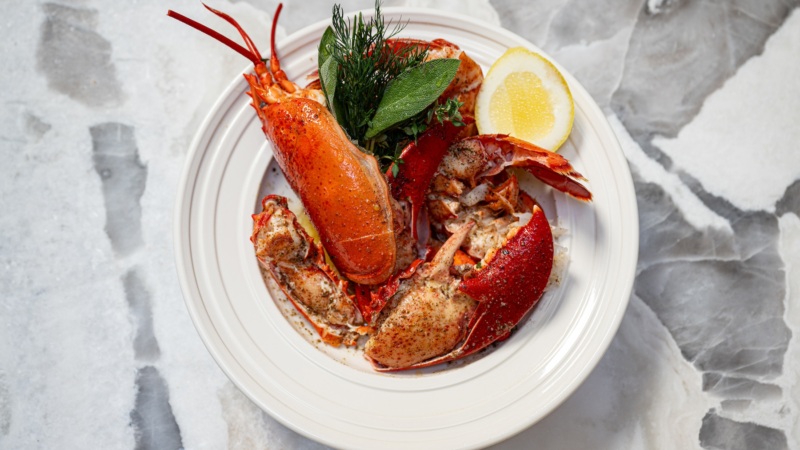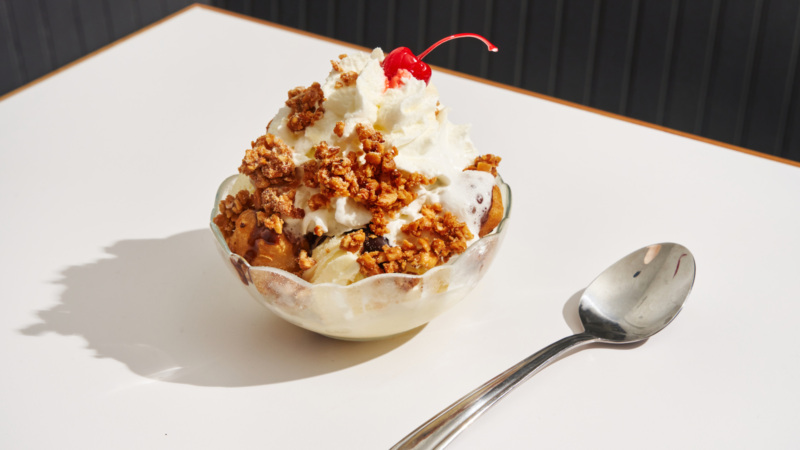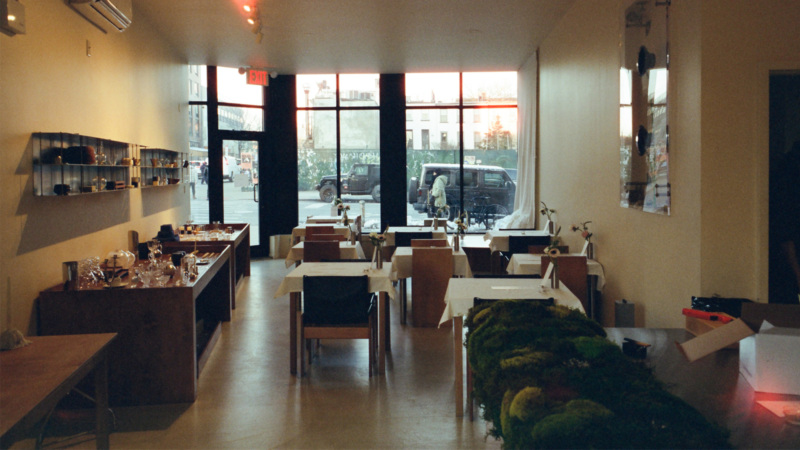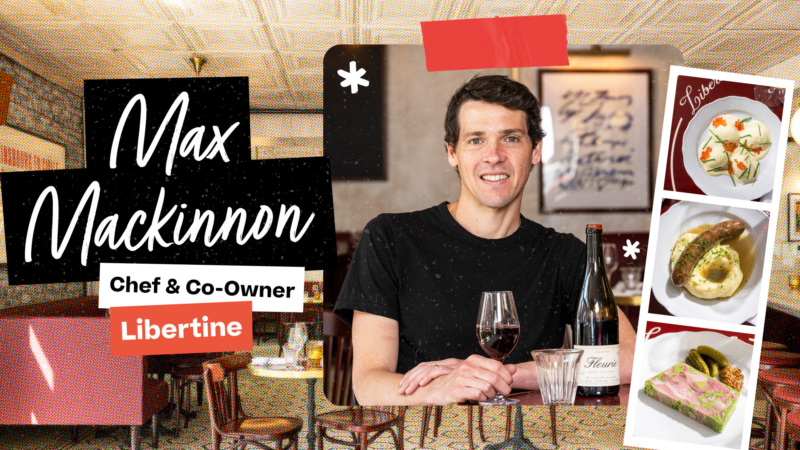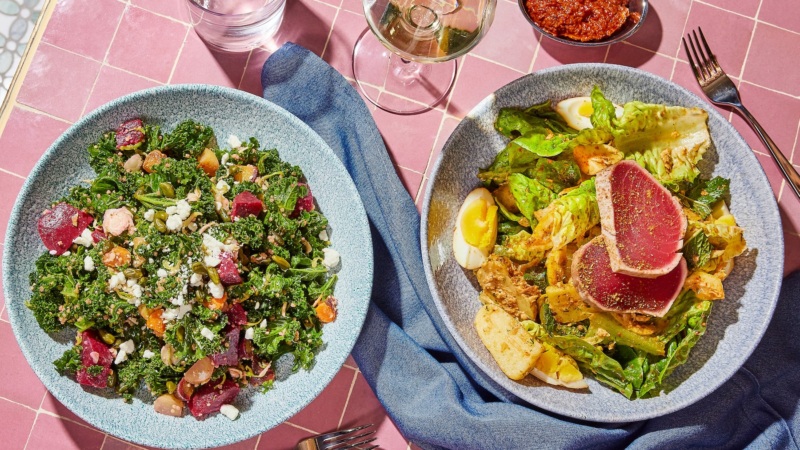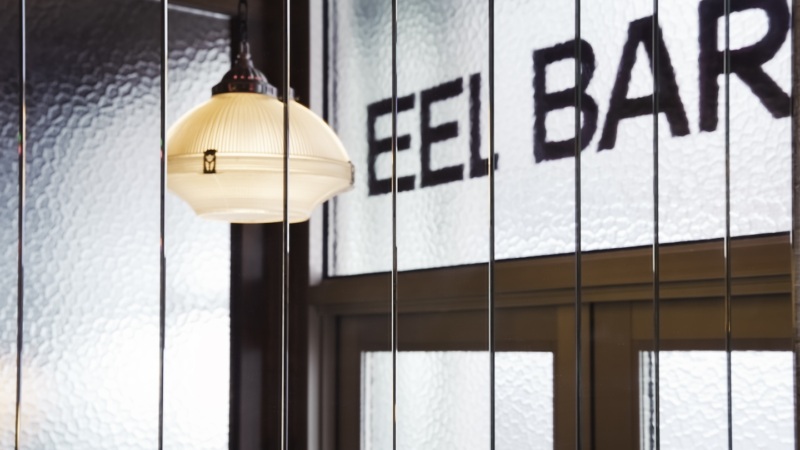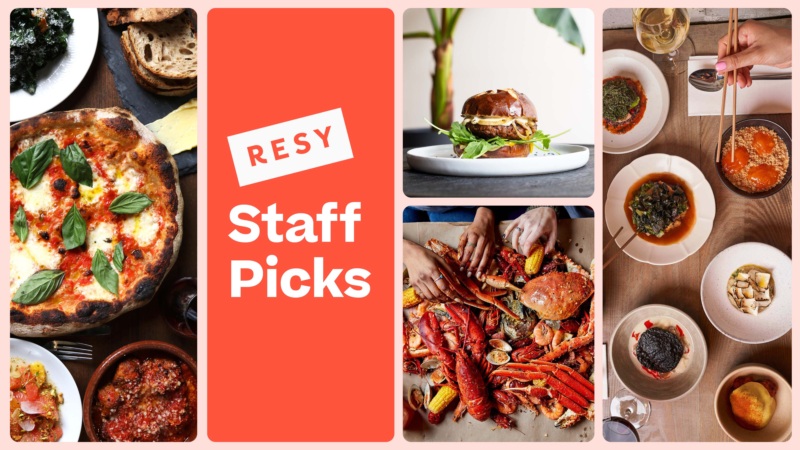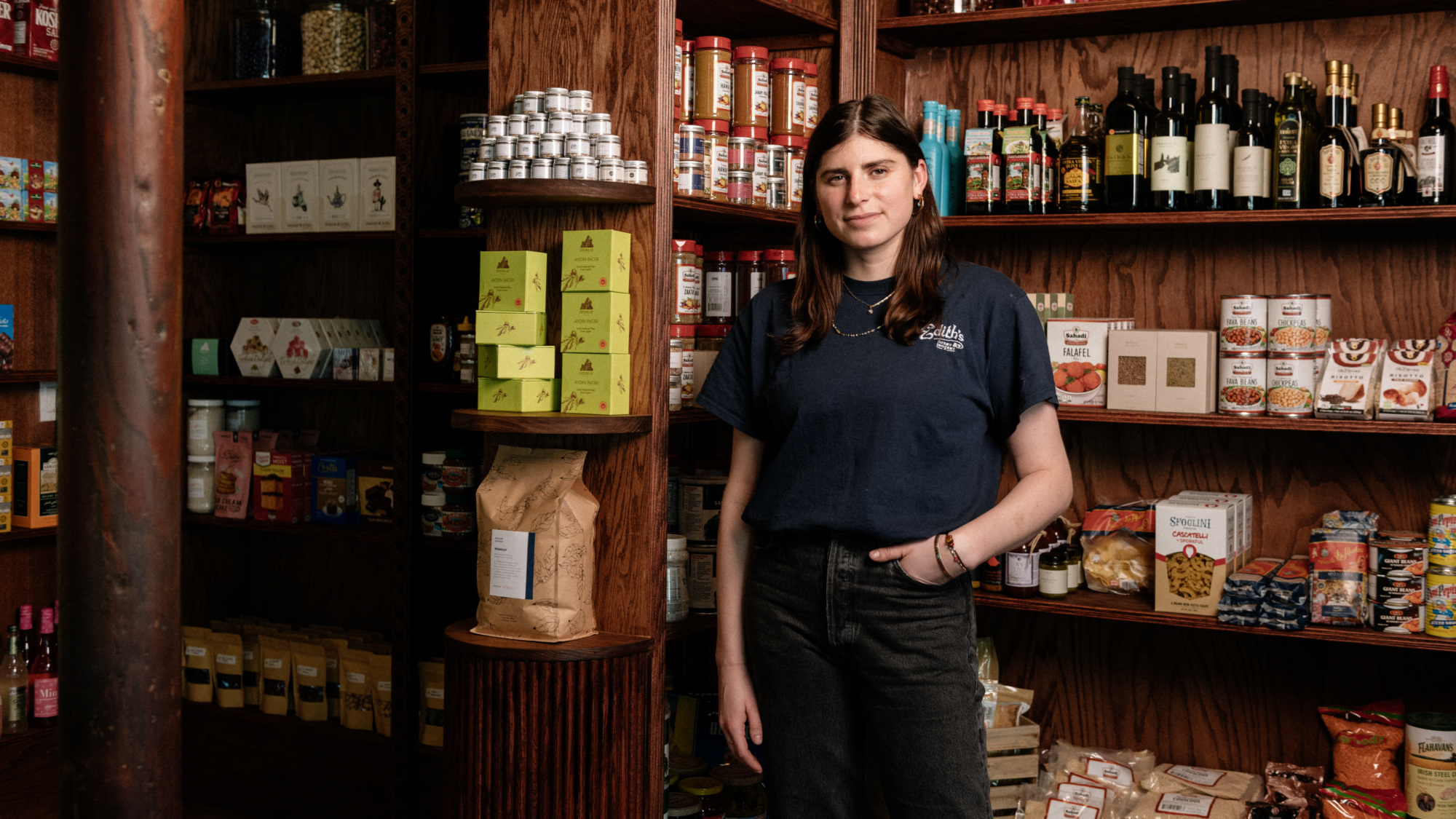
At Edith’s Eatery & Grocery in Brooklyn, Elyssa Heller Kibitzes Like Bubbe Would
In the summer of 2020, Elyssa Heller launched Edith’s, a bagel pop-up out of Paulie Gee’s pizzeria in Greenpoint, Brooklyn, setting in motion her exploration of the modern diaspora of Jewish cooking. She named the business after her great aunt, the matriarch of her family, and it has since become two different businesses: Edith’s Sandwich Counter and Edith’s Eatery & Grocery, both in Williamsburg. At both, she’s expanding on and redefining the immutable Jewish deli for the times.
For Heller, the journey, her mission, starts with her shelves at the eatery, a multinational larder of Jewish ingredients that she calls on to inform her weekday breakfast, weekend brunch, and soon, nightly “snack time” and dinner menus.
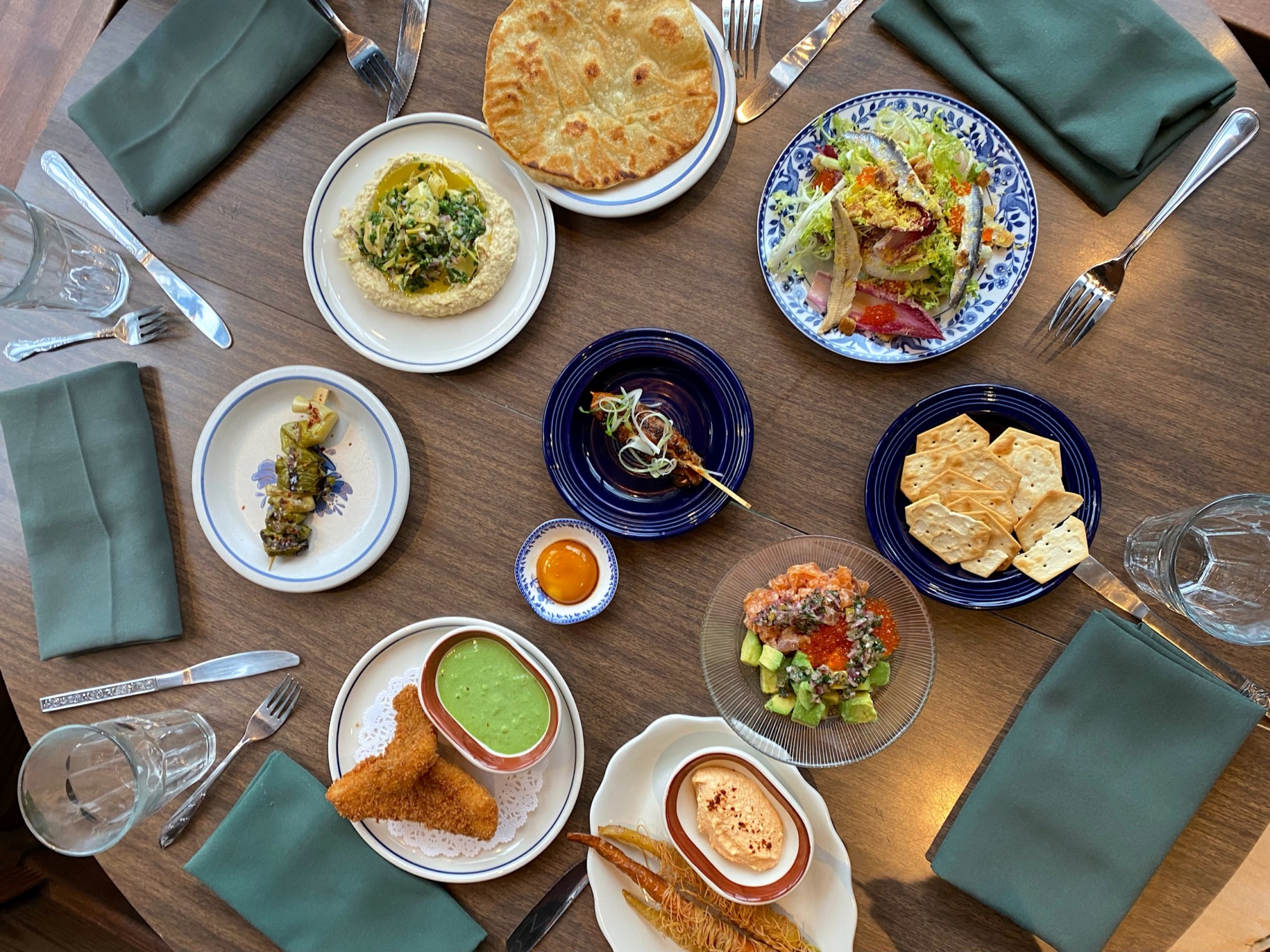
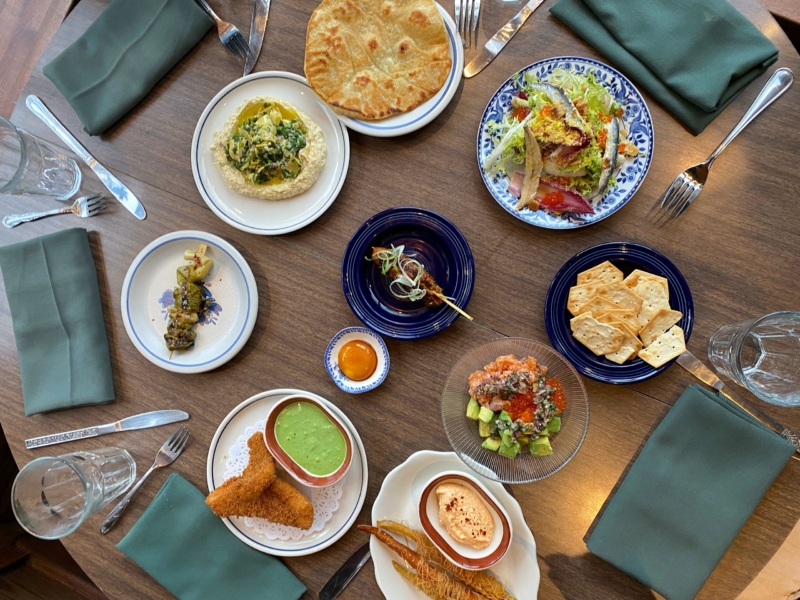
The hallway between the front counter and back cafe of Edith’s Eatery & Grocery acts as the annals of Heller’s food-filled life. A framed tri-fold menu from Barnum & Bagel, a circus-themed Jewish deli in the suburbs of Chicago that she frequented as a child, hangs next to generations of faded family portraits and a movie poster image of “The Blues Brothers.” Across the way there’s a portfolio of pen-and-ink cartoons drawn by her grandfather, all commentaries on the Korean War.
“Nobody kibitzes like me,” says Heller, whose mission is to make peace over forshpeis — small bites like thousand-layer golden potatoes with schmaltz and mustard, Sephardic sweet potato curry with tahini and crispy pepitas, and a fritto misto of wild mushrooms with za’atar. The new space is cozy and cavernous; it occupies a prime corner spot that’s only a five-minute walk away from the sandwich counter. We hover around bistro tables set with metal condiment carriers, when Heller admits that this is as close as she’s come to kibitzing in a while, sighing over the lost art of sitting, eating, and talking with family about their lives, if only for a brief bissell. With Edith’s, it’s clear that Heller wants to spark larger conversations about the Jewish diaspora not just here in New York, but on a global scale.
“I went to Hebrew school and never learned parts of Jewishness outside of Ashkenzai,” admits Heller, who calls her heritage’s offerings “white and brown,” pointing toward the palette of kugel and brisket. “Persian [food] is sour, fresh, and colorful … I really hadn’t had Iranian [cuisine] until New York.’’ These explorations are why Heller carries flaky Ta’amti malawach, a Sephardic/Yemenite bread that she serves pan-fried with grated tomato, and a spicy zhug made with green or red hot peppers, garlic, spices like coriander and cumin, and sometimes fresh herbs like parsley or cilantro, and an optional six-minute egg. In a similar vein there’s a “Jew-bano” of her own creation; it’s made with lavash, a flexible flatbread from the South Caucasus, that’s stuffed and then pressed like panini.
The bakery case in the back cafe, aka the Bazaar, is situated down a path of terracotta tiles from Fez. On the counter, almond cookies emulate tricolor Italian rainbow cookies, but instead of the red, white, and green layers, they glimmer with shades of the holy Tekhelet blue. Freshly baked bialys overflow with confit onions and are egg-washed so they don’t look “dusty,” an update to the aesthetic of bialys before. Heller doesn’t hesitate to warn all customers that slicing a bialy has long been a shonda, or a disgrace.
With Edith’s, it’s clear that Heller wants to spark larger conversations about the Jewish diaspora not just here in New York, but on a global scale.
If the aim is bringing people into this new scope of what’s Jewish, it’s amplified by collaboration on the menu. For example, there’s a tahina halva chess pie from local Petee’s Pie Company. La Boite Chicago-style spice blend, the same you’d see sprinkled on a hot dog in the Windy City, is speckled with chiles and celery salt, and actively used on the menu, whether on top of eggs or as a dusting on fries. Even The Sporkful x Sfoglini’s famed cascatelli is made into a curried pasta salad with pine nuts, currants, and carrots.
Each dish is a kindred blend of eclectic ingredients and influences. The labneh-based parfait is layered with seasonal fruit jam, house-baked granola with chickpeas, buckwheat, dried cherries, and fresh seasonal fruit. The menu includes a Kahvalti Turkish breakfast, which includes two eggs “made your way,” mushrooms or Merguez sausage, a mezze of pickles, vegetables, and pasteurized Egyptian Ackawi cheese. Heller describes that cheese as “if feta and mozzarella had a baby, but with less salinity, a little softer, and melts extraordinarily well,” served alongside housemade bazlama, a type of flatbread.
At Edith’s, they butcher and smoke all their own meats, from brisket to turkey shawarma pastrami — even fish comes in whole and is broken down. (Heller’s father is a fisherman.) Arctic char prepared like lox, Edith’s most popular seafood item, can be purchased by the pound, or ordered via the Smoked Fish Plate for two. The deli board boasts a compulsory chopped salad, as well as syrniki, Russian pancakes made with farmers cheese and tart currants instead of the usual lingonberries, with a dollop of housemade smetana, a Central/Eastern European dairy product similar to crème fraiche.
“It’s like if a blintz had an identity crisis,” says Heller, who admits it’s made more like a Japanese soufflé pancake thanks to the influence of head chef Christina Jackson, who has been collaborating with Heller since the pop-up. Jackson, who previously cooked at Tetsu, Masayoshi Takayama’s robatayaki restaurant, is Japanese, and she pickles Boston mackerel similarly to Japanese cured mackerel known as shime saba, presenting it as if it were pickled herring and cream. This isn’t the only cross-cultural effect; the chicken schnitzel has a southern twist, with the breaded chicken served atop a schmaltzy cornbread. Still, everything ties back to Heller’s Jewish roots in some way, and that’s very evident when you start to peruse the grocery shelves.
“Yiddish was my bubbe’s first language,” Heller says. This is reflected on the handwritten placards above the dry good grocery shelves: nosh, oy, schmaltz, and grivalach, but also garinim, which refers to Israeli sunflower seeds usually served in a little cup before a meal, and zakuski, small cold dishes of Russian origin. Shuttenherein, or shiterein, describes someone who cooks from experience and touch, rather than using a recipe, which is how Heller’s own Jewish cooking has evolved.
Small notecards, aka “talkers,” describe the products with casual anecdotes, ranging from how delightfully crunchy Frankie’s Fine Brine Classic New York deli pickles are, to recommendations for liberally applying a jug of Galil amba, a pickled mango sauce, to everything possible. Cans of Old Riga smoked sprats from Latvia are the same ones her father serves at his banya, called Sky Fitness, in the Chicago suburbs, sitting front-and-center with all the very-of-the-moment tinned fish. Whether it’s a bottle of NY Shuk’s fiery red harissa, or a jar of Nasrin’s kitchen brilliant vegetable jams, Mina’s tagine Moroccan chicken sauce, or Canaan’s maftoul, a Palestinian couscous, or freekeh, a smoky super-grain, Heller is all about highlighting foodstuffs that are truly reflective of the global Jewish diaspora, and she wants to give these ingredients context in everyday cooking, too.
Her greatest goal with Edith’s is to redefine “what Jewish food is.” Heller’s free in-house ‘zine, called Kibbitz, is an ode to Trader Joe’s Fearless Flyer, with stories about what being a contemporary Jew in the food world means, complete with a Jewish food horoscope and lessons on how to cook with cannabis. In other words, what’s culturally Jewish isn’t consigned to just matzo ball soup anymore.
On April 6, Heller is debuting a snack time menu of dips, like house smoked salmon with seasoned avocado and housemade hummus with marinated artichokes, and small bites like a sweet-and-sour tsukune, a beef and currant meatball glazed in a smoked pineapple sweet and sour sauce. There will also be fried rock fish, a charcuterie board, and a variety of cocktails, including a spicy zhug margarita. It’s a precursor to the larger dinner menu to come in May, which she hinted may draw from Jewish-Italian culinary traditions.
As the sun sets, intense rays of light beam inside the entrance of Edith’s, and the employees pull down the shades to see more clearly. Soon, it’ll be time to close. But before they do, Heller points to a saying scribed inside her shop. It reads “Tikkun Olam,” a Yiddish phrase which means to leave the world in a better place than it was before.
Edith’s Eatery & Grocery is open daily from 9 a.m. to 5 p.m. and on Wednesdays through Sundays for snacks from 5 to 9 p.m., with dinner launching next month.
Michael Harlan Turkell is a photographer, writer, and cookbook author. He’s also host of the Modernist Pizza Podcast, which explores the art, history, and science of pizza. Follow him on Instagram and Twitter. Follow Resy, too.
Discover More
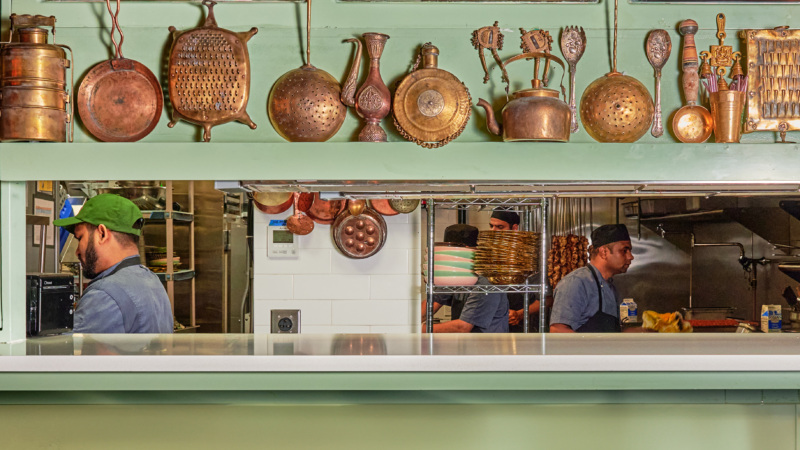
Stephen Satterfield's Corner Table


